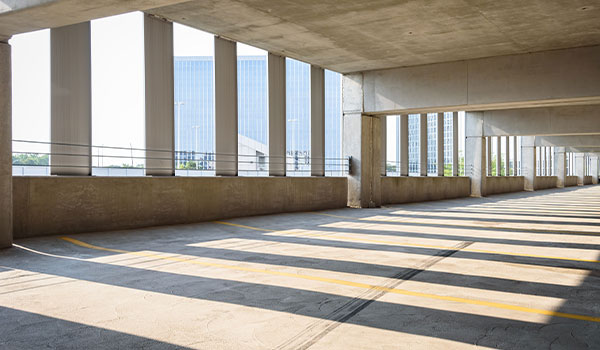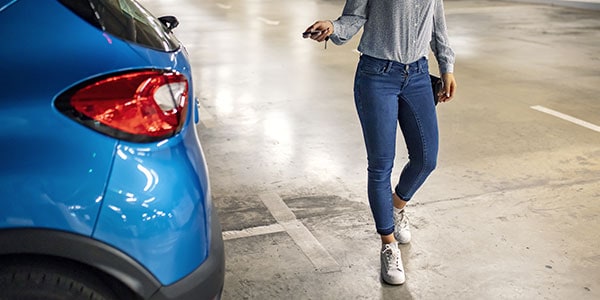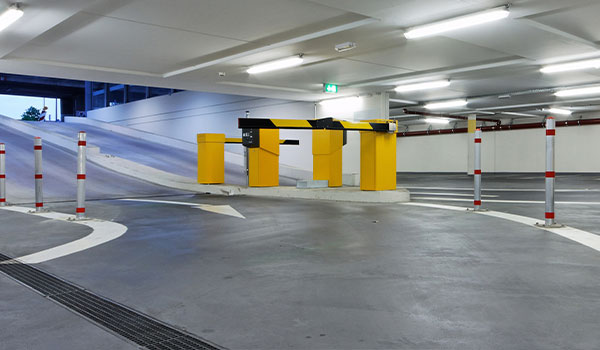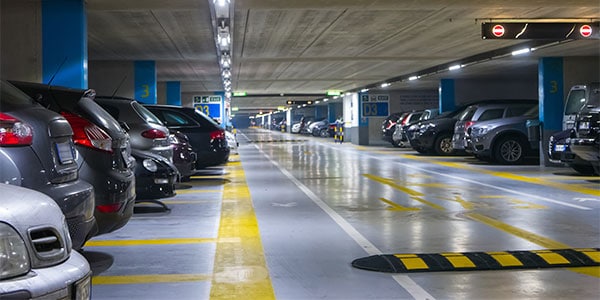Surface Coatings for Parking Garages
Drivers, office workers, and retailers expect parking garages to provide safe and convenient spaces 24-hours-a-day, seven-days-a-week.

But parking garages endure exposure to inclement weather conditions along with heavy traffic use.
Though intended to last for decades, these structures need regular maintenance to remain safe and attractive. Otherwise over time, the concrete in a parking garage may become damaged through prolonged exposure to weather and outside elements.
Water from precipitation can penetrate the concrete in a parking garage and corrode the rebar. Freeze-thaw cycles, hot tires, and gas and oil leaks also add to the everyday wear-and-tear in an offsite parking structure. Heavy loads and tire chains can do major damage to concrete, too.
Lines and arrows painted on floors will fade after they’re driven over day in and day out. Thankfully, combating this wear and tear can be as simple as choosing the right floor coating system. A fresh floor coating can have an old parking garage looking like new in a short time.
Resurfacing your parking garage with a finish that goes the extra mile will keep your parking deck safe, functional, and in great condition. Options for parking deck repainting and resurfacing include the following:
Let's solve your flooring problems together.
Chemical and wear-resistant floor coatings
The right floor coating can protect your parking garage and reduce the damage caused by these corrosive leaks. A heavy floor coating such as epoxy can help repel oil, grease, brake fluid, and de-icing salts.
Typically, we apply a stain-resistant seal that penetrates the concrete. It usually takes two coats to get the quality you need, and we can spray, roll, and/or brush it on. For floors already marred by heavy stains, we can start with a degreasing agent that goes on about a week before the seal. One application of this agent makes it easier to scrub up oil and fluid stains. The epoxy coating itself comes in both clear and colored options. We can also cast in paint chips for a showier look or aluminum oxide to make floor slip resistant.

Slip-resistant floor coatings
More than 50,000 injuries and 500 deaths occur in parking garages and parking lots every year according to the National Safety Council. Some of these accidents happen due to drivers trying to navigate tight corners and shadowy passages. But often, pedestrians in parking garages simply get distracted. They're looking at handheld devices, trying to find the exit, or rushing to a meeting. An oil spill, wet spot, or icy patch goes unnoticed. Until the worst happens.
From wet spots under leaky vehicles to coffee spills in the stairwell, garages with slick floors can be dangerous for your travelers. You can reduce the risk of injuries with the right parking garage floor coating.
An aluminum oxide additive to a floor coating helps prevent dangerous slips and falls. When added to epoxy, polyaspartic, or urethane 2 component coatings, aluminum oxide bonds into the coating without altering its physical properties. These slip-resistant additives do not change a floor's color or decorative appearance.

Moisture vapor-controlled floor coatings
Rain, sleet, snow, and even humidity can wreak havoc on concrete as the moisture works its way into cracks and crevasses. But water damage doesn't just come from outside.
Concrete itself contains water as a key component of the mixture. If the concrete wasn't allowed to cure for at least 28 days, moisture may seep through the barrier. Not only does moisture cause blistering and peeling, but it can keep a ground floor from adhering to the slab underneath.
The right floor coating will prevent moisture from damaging your concrete from the ground up. A moisture vapor-controlled coating is a type of epoxy that goes on as a fluid. It only takes one coating. The product comes in three possible thicknesses — 12 mils, 17 mils and 22 mils. We determine the right thickness for your parking garage based on the age of the concrete and its moisture evaporation rate.

Safety ID floor coatings
Parking garages are among the unsafest places in America. They're cramped, dark, often confusing, and frequently filled with inattentive drivers and pedestrians. As a result, parking garages need crisp, visible floor markings to help guide people safely and efficiently to their destination.
Clearly marked pedestrian walkways, traffic lanes, parking spaces, and directional arrows allow your parking garage to operate at maximum efficiency.
Called functional aesthetics, these markings resist the heavy wear and tear they experience in a parking garage. They also need to meet OSHA floor marking regulations. The right floor coatings can keep people safe, cut confusion, and keep your garage functioning like a well-oiled machine.

Let's Talk.
Let our experienced team help you select the flooring grade that will increase the value and longevity of your garage. We have more than 40 years of experience in this industry, and our services are available throughout all regions of South Carolina, North Carolina, Tennessee, Georgia, and Alabama. From our first phone call to our final walkthrough, we’ll guide you through every detail of your coating project.
If you’re interested in learning more about resurfacing your parking deck, give us a call at (864) 855-0600 or contact us online. We’d love to talk with you about your needs and the solutions CPC Floor Coatings has to offer.




